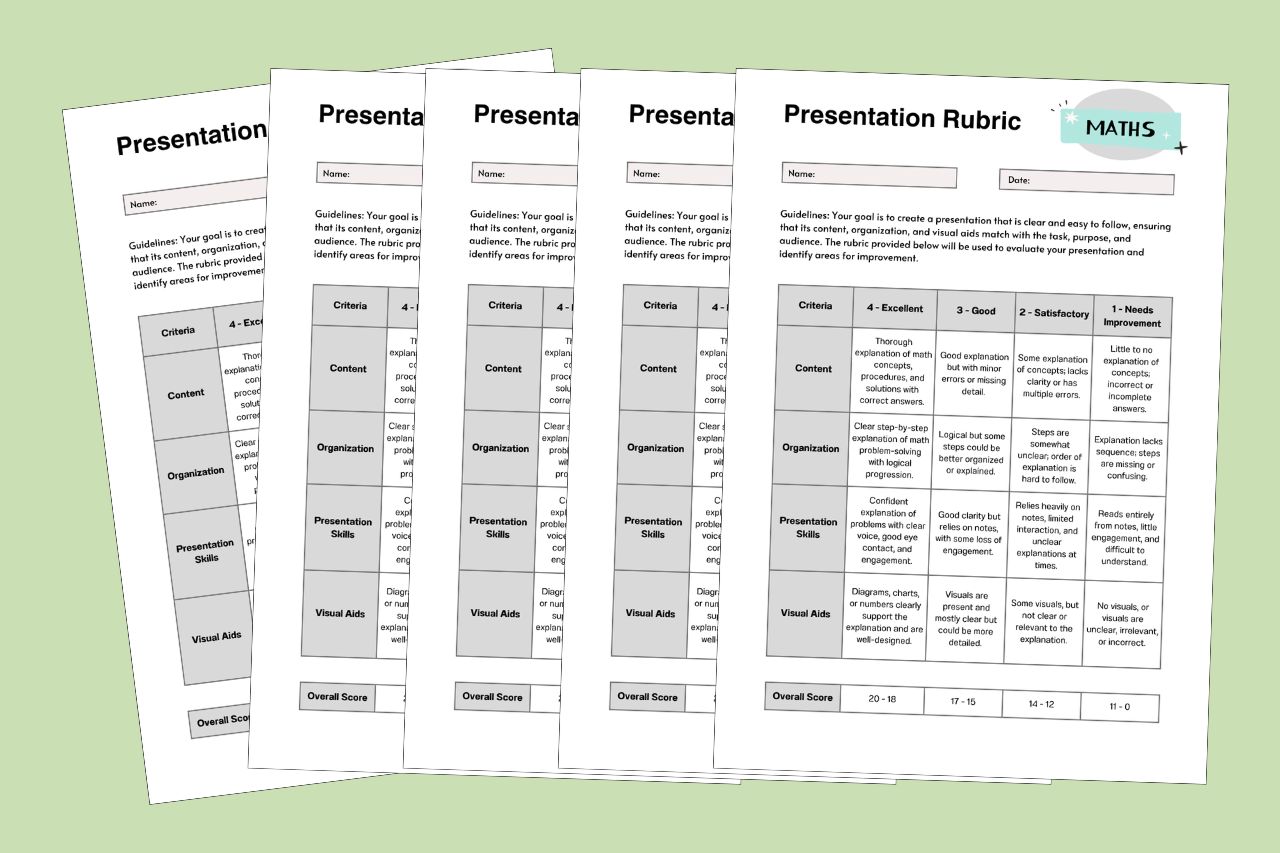Math oral presentation rubrics for homeschooling students come with their own benefits. In this article we will explore the power of oral presentation rubrics in the homeschool classroom.
In homeschool settings, we have the unique opportunity to shape how math is both learned and communicated. Math is often considered a subject focused solely on numbers and problem-solving, but adding oral presentations into the mix can unlock a world of deeper understanding and critical skills.

Here at EduKitchen, we believe that incorporating oral presentation rubrics into your math curriculum can provide a structured, interactive way for students to engage more deeply with math concepts.
The Power of Oral Presentation Rubrics in the Homeschool Classroom
We have designed a set of standards for our oral presentation rubric (pdf format) for the the math classroom that we think teachers will find easy to implement in any level classroom. Click here or on the image link to access our math oral presentation rubric.

If you are a Canva teacher, we have a colorful version of our presentation rubric available on our profile: The ETI Academy for Teaching and Learning. You can check out our rubric here.
Oral presentation rubrics help homeschool students organize, express, and present their mathematical thinking. Here’s how these rubrics can transform math learning in your homeschool classroom:
1. Strengthens Understanding of Math Concepts
When students present math problems aloud, they need to explain their steps, calculations, and reasoning—building their understanding as they articulate the process.

With a rubric to guide them, homeschool students can clarify their own thoughts and make sense of math in a more structured way. This process encourages students to become both the problem-solver and the teacher, reinforcing their knowledge as they “teach” their math reasoning to others.
2. Develops Critical Communication Skills
Effective communication is key to any subject, and math is no exception. Oral presentation rubrics encourage students to explain concepts clearly, use math vocabulary accurately, and describe their problem-solving methods in a logical way.

homeschool students, this can be a valuable step toward building confidence in public speaking, which is often overlooked in traditional math education. Presenting math solutions teaches them to communicate complex ideas simply and directly—skills that will benefit them far beyond the homeschool classroom.
3. Builds a Habit of Logical and Sequential Thinking
Presenting a math solution isn’t just about getting the answer; it’s about showing the process in a logical order. Oral presentation rubrics guide students to organize their thoughts sequentially: first introducing the problem, then demonstrating each calculation, and finally concluding with their solution.

This step-by-step approach instills logical thinking habits, helping students approach math problems (and other challenges) in an orderly, systematic way.
4. Creates a Clear and Objective Evaluation System
With a rubric, assessing math presentations becomes objective and clear. Homeschool students benefit from knowing exactly what’s expected, whether it’s explaining calculations accurately, using math vocabulary correctly, or maintaining a logical flow.

This transparency reduces stress and helps students understand where they excel and where they need improvement, making it easier to track their progress over time.
5. Promotes Confidence and Reduces Anxiety Around Presentations
Speaking about math can be challenging, but rubrics provide homeschool students with a reassuring guide. Knowing the criteria they’ll be evaluated on—such as clarity of explanation, logical organization, and appropriate vocabulary—can ease presentation anxiety and build confidence.

Over time, students become more comfortable expressing their math reasoning, which can make them feel more capable and confident in other subjects as well.
6. Encourages Self-Reflection and Growth
An oral presentation rubric gives students specific areas to focus on for improvement, helping them self-reflect on their performance. For instance, if a student scores lower in “clarity of explanation,” they know to work on articulating their steps more clearly next time.

This self-assessment empowers students to take ownership of their learning and encourages a growth mindset that values improvement and progress.
7. Prepares Students for Real-World Communication
In the real world, math skills often intersect with communication skills. Whether explaining data, proposing solutions, or teaching others, being able to clearly present math-based ideas is crucial.

Oral presentation rubrics help students gain early experience with this, preparing them to communicate math concepts confidently in real-world situations.
Creating a Simple Math Oral Presentation Rubric for Your Homeschool Classroom
Here’s an example of a basic rubric to use for math presentations in your homeschool classroom:
- Clarity of Explanation: How well does the student explain each step of their problem-solving?
- Use of Math Vocabulary: Are key terms used accurately and appropriately?
- Logical Organization: Is the presentation organized in a clear, logical order?
- Confidence and Delivery: Does the student speak confidently and maintain an engaging pace?
- Engagement with the Audience: Does the student respond to any questions and make eye contact (if applicable)?
This rubric can be adjusted to fit your student’s grade level and math complexity, helping you provide a supportive, constructive way to assess math presentations.
Conclusion: Bringing Oral Presentation Rubrics into Your Homeschool Math Classroom
At EduKitchen, we’re all about blending practical learning with subject mastery. Using oral presentation rubrics in the homeschool math classroom can foster clearer understanding, boost communication skills, and build confidence in sharing ideas. It’s more than just a grading tool—it’s a roadmap for meaningful learning, self-assessment, and personal growth.

If you’re ready to try it out, start with a simple rubric and let your homeschool student present their next math solution. You might be surprised at how much they learn by explaining math out loud—and at how much fun they have in the process!
Five Tools to Help Students With Oral Presentations in the Classroom
This blog contains Amazon affiliate links to highlighted websites and/or resources. By clicking on the link and making a purchase we may earn a small commission at no extra cost to you. Click here for full disclosure.
Here are five Amazon tools that can support teachers in helping students prepare for and deliver engaging oral presentations:
- Voice Amplifier – A lightweight, wearable voice amplifier can help students project their voice confidently in larger rooms. It’s especially helpful for students who may be shy or soft-spoken.
- Flashcards with Key Points Prompter – Blank or topic-specific flashcards allow students to jot down key points, keeping them focused during presentations without reading directly from a script.
- Time Timer Visual Timer – This visual timer helps students manage their time effectively, allowing them to practice pacing and timing for different sections of their presentations.
- Portable Wireless Presenter with Clicker – A handheld wireless presenter clicker allows students to seamlessly move through their slides, helping them look more professional and stay engaged with their audience.
- Adjustable Desktop Microphone – A USB microphone can improve audio clarity for recorded presentations, especially helpful for virtual or hybrid classroom settings.
These tools can enhance student confidence, improve clarity, and allow for more polished, engaging presentations in any classroom setting.
Join Our Community of Teachers
Sign up to receive monthly access to the latest resources that help support homeschooling parents in the maths classroom.
Related Topics
- Math Teaching Guides for the Homechool Classroom
- Math Worksheets for the Homeschool Classroom
- Teaching Math as a Language to Children
- 5 Ways to Support Children Struggling with Math Anxiety
- Why Math Can Be Really Hard for Children
- Tips to Problem Solving in Math for Homeschool Learning
- 5 Ways to Improve Math Skills in Children
- Make Learning Fractions Fun With our Fraction Templates
- International Pi Day Activity for the Homeschool Classroom
- Oral Presentation Rubrics for the Science Classroom
- Oral Presentations for the English Language Arts Classroom
Share Your Thoughts!
Oral presentation rubrics not only make presentation easier for students they also make the writing process more accessible and enjoyable for students, setting them up for success as writers. How do you plan to use these rubric resources in your classroom? Share your ideas and experiences in the comments below!




